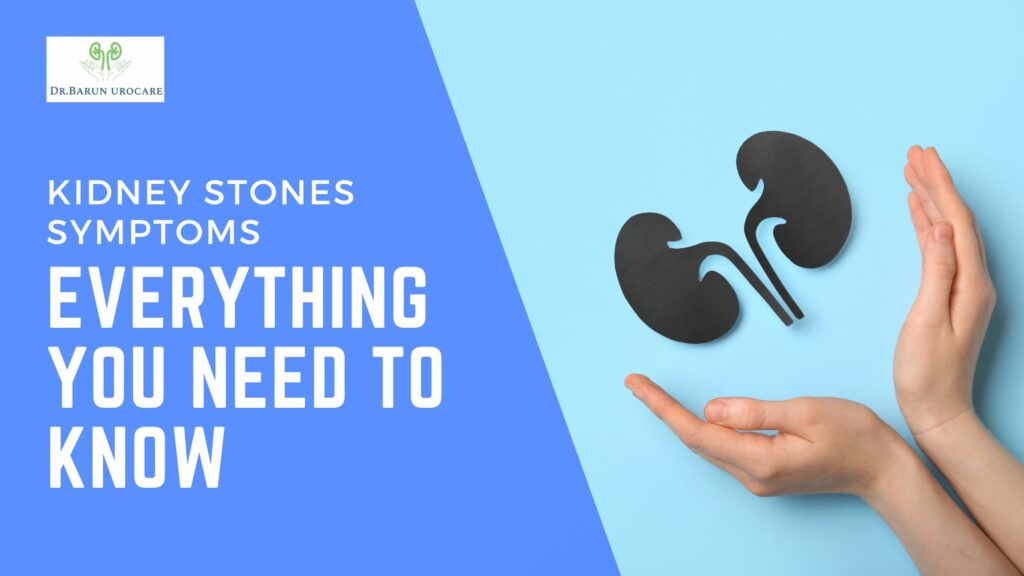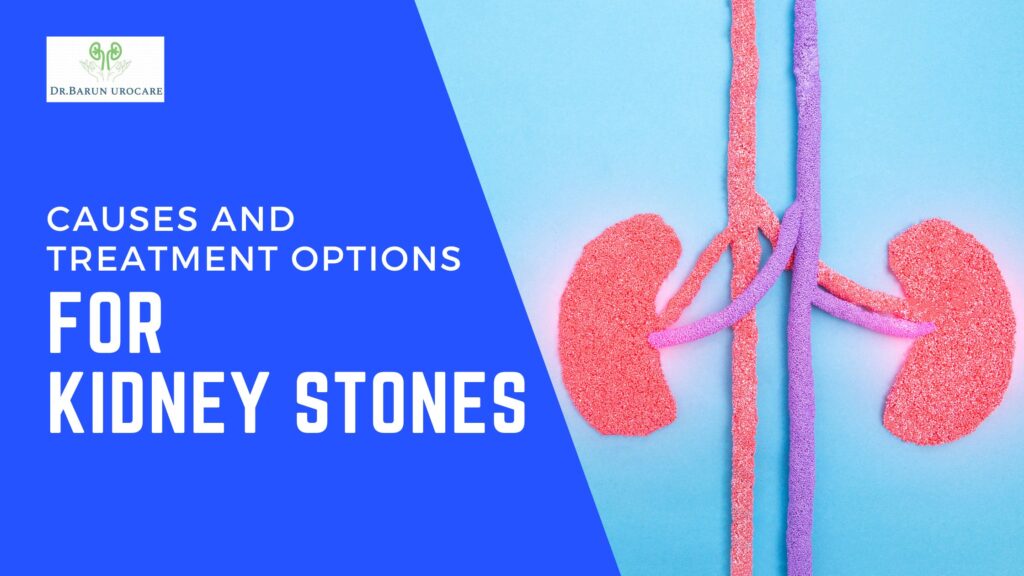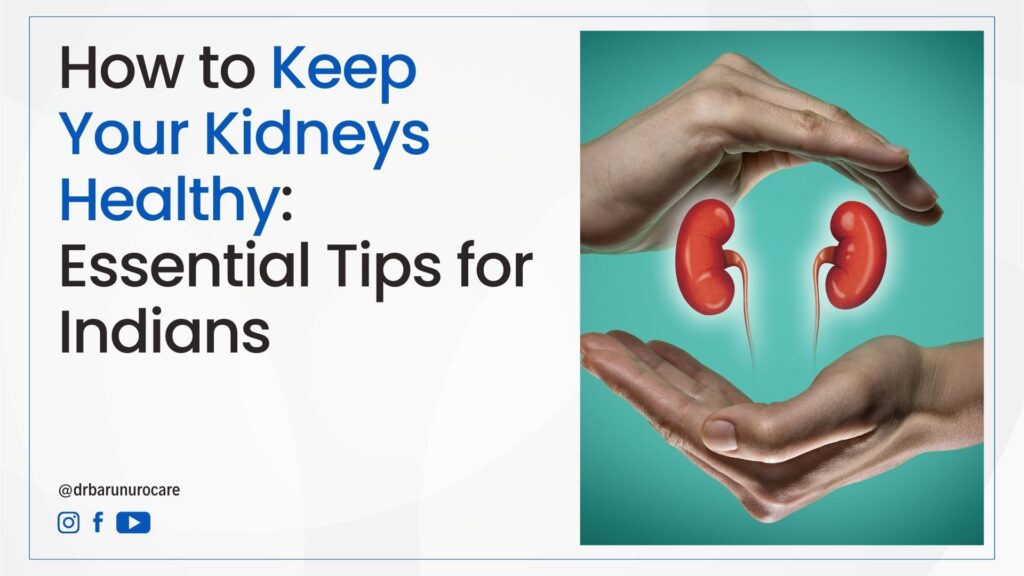Millions of people experience kidney stones every year throughout the world. These solid buildups, develop in the kidneys, which can cause anything from little discomfort to terrible pain. For early detection and treatment of kidney stones, which can have dangerous side effects if left untreated, it is essential to be aware of their signs and symptoms.
In this article, we will cover all that you need to know about kidney stone symptoms, along with the most typical warning signals to look out for and risk factors that raise your risk of forming stones. Continue reading to find out more about this illness and how to seek the care you require if you are feeling pain or discomfort in your lower back or abdomen, changes in your urine, or any other strange symptoms.
What are Kidney Stones?
Hard, crystal-like deposits known as kidney stones develop in the kidneys. They are made up of a variety of chemicals, including calcium, oxalate, uric acid, and cystine, which can crystallize and clump together. The stones can range in size and shape from small grains to huge, angular masses.
Kidney stones come in a variety of forms, each with its own unique composition and cause. The most typical kidney stone is composed of calcium oxalate and develops when the urine contains an excessive amount of both calcium and oxalate. A buildup of cystine, an amino acid that the kidneys are unable to adequately absorb, struvite, or uric acid in the case of gout, can result in other types of kidney stones (a type of stone that can form after a urinary tract infection).
Many symptoms, which can be excruciatingly unpleasant, can be brought on by kidney stones, including back or stomach discomfort, changes in the color or flavor of the urine, as well as nausea or vomiting. Kidney damage or infection are more severe problems that might occasionally result from kidney stones. It’s crucial to consult a doctor as soon as you think you might have kidney stones in order to receive an accurate diagnosis and the best course of therapy.
Common Symptoms of Kidney Stones
Intense back or abdominal discomfort is one of the kidney stone’s most typical symptoms. This pain may start quickly and be so intense that it makes it impossible to stay still or stand still, as well as produce nausea and vomiting. The groin, lower abdomen, testicles, or labia may all experience pain in addition to other areas of the body.
Changes in the color or smell of the urine are some more kidney stone symptoms. For instance, urine can be dark, murky, or strongly scented. The presence of blood can also be seen by the color of the urine, which might be pink, red, or brown.
In addition to frequent urination, some kidney stone sufferers may also feel a burning sensation or a sense of urgency when urinating. In some circumstances, the stones may obstruct urine flow, causing pressure to build up in the urinary system and perhaps leading to infection or kidney damage.
Even if some but not all of these symptoms are present, kidney stones may not actually be present. While some people may only experience little discomfort or no symptoms at all, others may experience more serious or enduring effects. It’s crucial to visit a doctor if you think you might have kidney stones so they can be properly diagnosed and treated.
Less Common Symptoms of Kidney Stones
While some of the most typical symptoms of kidney stones include back or abdominal pain, changes in urine color or odor, and frequent urination, there are several more warning signals to look out for. Here are a few less typical kidney stone symptoms:
- Fever and Chills: Kidney stones can occasionally result in a fever and chills, especially if an infection is present.
- Nausea and Vomiting: Some kidney stone sufferers may also experience nausea and vomiting in addition to back or abdominal discomfort, particularly if the pain is severe.
- Urinary Retention: If the kidney stones are large enough, they may obstruct the urine’s flow out of the bladder, making it difficult to pass urine or perhaps impossible.
- Changes in Urine Color: Changes in urine color are a typical kidney stone sign, however, some patients may also notice blood in their pee. This may mean that the urinary tract is irritated or damaged by the stones.
- Urination that Hurts: Some kidney stone sufferers may experience pain or discomfort while urinating in addition to urgency or burning.
Risk Factors in Kidney Stones
Your chance of acquiring kidney stones may rise due to a number of circumstances. They consist of:
- Dehydration: When you don’t drink enough water, the concentration of minerals and salts in your urine rises, increasing the likelihood that kidney stones will develop.
- Family History: Your likelihood of developing kidney stones may increase if someone in your family has had them.
- Age and Gender: Kidney stones are more common in males than in women, and the risk rises with age.
- Diet: Kidney stones are more likely to form if you eat a diet that is high in animal protein, sugar, and sodium while being poor in fiber.
- Obesity: Being overweight or obese can raise your chance of acquiring kidney stones.
- Certain Medical Conditions: You may be more likely to develop kidney stones if you have certain medical problems, including gout, inflammatory bowel disease, and persistent diarrhea.
- Certain Drugs: Several drugs, like diuretics and calcium-based antacids, can raise your chance of getting kidney stones.
When to See a Doctor?
It’s crucial to consult a doctor as soon as you can if you have symptoms that you think may be related to kidney stones. Here are several indicators that you should see a doctor:
- Severe or Prolonged Pain: You should consult a doctor as soon as possible if you are suffering severe or persistent pain in your back or abdomen, particularly if it is accompanied by nausea, vomiting, or a fever.
- Blood in the Urine: Even if it’s just a little bit, you should consult a doctor if you find blood in your urine.
- Urinary Incontinence: If you are unable to urinate or are having trouble passing urine, you should seek medical assistance right once.
- Recurrent Symptoms: If you have a history of kidney stones and are experiencing repeated symptoms, it’s vital to contact a doctor to evaluate your situation and determine an appropriate treatment plan.
- Additional Worries: You should speak with your doctor if you have any further worries or questions about your symptoms or if you are exhibiting any other unusual symptoms.
Conclusion: Kidney Stone Symptoms
Kidney stones are a frequent condition that can result in a variety of bothersome symptoms, including changes in the color or flavor of the urine as well as back or stomach pain. While many individuals will suffer kidney stones at some point in their lives, you can take precautions to lower your risk of getting them by eating a nutritious diet and being hydrated. In order to receive an accurate diagnosis and the best course of treatment, it’s crucial to consult a doctor as soon as you notice any kidney stone symptoms. Most people may effectively manage kidney stones and avoid recurrences with the right care and attention.



